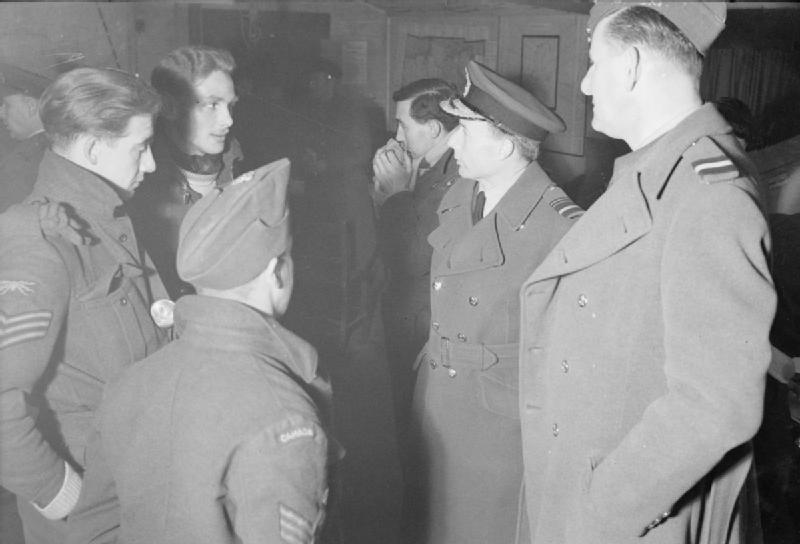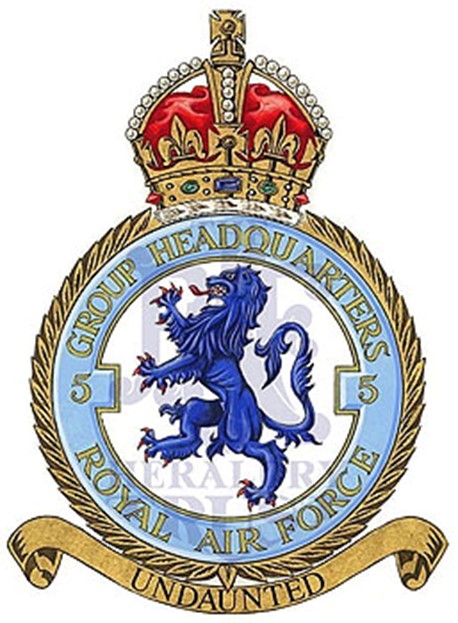Stories
Stories
Demanding Continuous Improvement

AVM Ralph Cochrane, Commander 5 Group (centre wearing cap), talks with aircrew returned from a bombing raid, 1944
(Image Credit Unknown)
In the air war over Europe, the need for constant improvement in technology and operations is self-evident. From the development of aircraft (Whitley to Lancaster), weaponry, navigational aids, target identification (Pathfinders), enemy detection, and more, the war years demonstrate an unprecedented technology race, not seen again until the space race in the 1960s.
Nonetheless, the success of Bomber Command also reflects a continuing demand for improvement and indeed a competitive element we see these days in sporting and business excellence.
The Bomber Groups under Sir Arthur Harris, while sharing a common enemy, were equally competitive, exhibiting traits we know well these days in other walks of life. By way of example, the following excerpt from a newsletter to 5 Group in November 1944 from Air Officer Commanding Ralph Cochrane (who had been instrumental in establishing the RNZAF before the war), recognises both recent successes of the Group and improvements in bombing accuracy, landing times and serviceability of aircraft.
But more was needed, from aircrew and ground crew, “the exertions of everybody on each station,” a demand for continuous improvement to “increase our pressure on the enemy and thus hasten his collapse.”
V Group News November 1944
Forward by A.O.C (Air Officer Commanding).
In sending Christmas greetings to all ranks of 5 Group, I do so with the greater pleasure because through their combined efforts over the past months, the hitting power of the Group has been raised to a new high level, and greater harm inflicted on the enemy than ever before. In November the Group completed the destruction of the Tirpitz, an event which brought in messages of congratulations from all branches of the Service and from many of our Allies. In November also, the Group again cut the Dortmund Ems and Mitteland canals thus ensuring that an overwhelming burden of traffic should continue to be thrown on the German railways. While to ensure that this task should be made even more difficult the Group also took part in the general campaign against railway centres, achieving highly satisfactory results.
These results were made possible by the steady improvement in the efficiency with which attacks are undertaken, and in the greater numbers of aircraft available. To give two examples of this improved efficiency. In November last year, the average Squadron error in practice bombing from 20,000 feet was 310 yards; this November it is 160 yards. This means that the number of bombs which may be expected to fall within the central area of a target is now four times as great as it was a year ago, and this is borne out by photographs.
Similar improvements in airmanship and crew discipline are shown by the reduction in landing times and in the lower accident rate. A year ago, the average interval between aircraft landing at night was 3.18 minutes, and the best Station in November 1943, only achieved 2.56 minutes. These times have now been halved, with a consequent reduction in the hazards of landing after an operation in conditions of poor visibility or low cloud, or when intruders are active.
Improvements on a like scale have been achieved in all other branches and sections and the serviceability rate is now higher than ever before, while the percentage of technical failures leading to early returns has been halved. These are most gratifying results deserving the highest praise; yet in no branch of Group activity have we yet reached the summit of our abilities or fulfilled our maximum expectations.
It is clear that the War will not now be over by Christmas although we can be fairly confident that this will be the last Christmas of the War in Europe. What is required therefore is a firm resolve to do everything in our power to reduce the number of days during which the War will continue to drag on. As a start I would ask air crews to aim at a reduction of the bombing error from 160 yards to 120 yards, and ground crews to determine that no aircraft shall remain on the ground if it can possibly be got ready in time to take off on operations.
Although the ultimate release of the bombs is the province of the aircrew, the scale of their effort depends upon the exertions of everybody on each Station, and it is to everyone, aircrew and ground crew, that I send this Christmas message urging them to put forward their every endeavour so that in spite of all that winter weather means, we continue to increase our pressure on the enemy, and thus hasten on his collapse.

No. 5 Group RAF